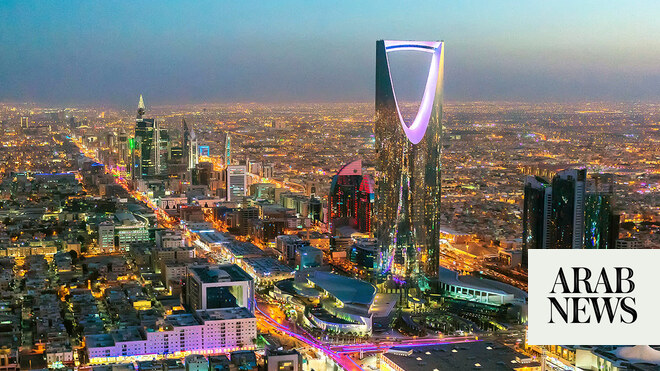RIYADH: The real estate market in Riyadh is experiencing significant growth, with rents for Grade A office spaces rising 20.8 percent year on year in the third quarter of 2024, reaching SR2,131 ($567.31) per sq. meter. This increase reflects the city’s expanding economic activity, driven by both a thriving private sector and ongoing government initiatives aimed at positioning the capital as a global business and investment hub. According to JLL’s latest market analysis, this surge in demand for high-quality office spaces is contributing to a historic low in vacancy rates, which fell to just 1.6 percent in Q3 2024.
The report attributes the rise in office rents to the Kingdom’s economic diversification efforts, particularly the continued growth of the private sector in Riyadh.
The city remains an attractive destination for businesses and investors, with strong demand for Grade A office space in key districts. JLL also highlighted that Northern Riyadh, with its superior accessibility and high-quality developments, is increasingly favored by occupiers, driven by the area’s efficient workspaces and ample parking, which help mitigate rising traffic congestion.
In Jeddah, Grade A office rents rose by 11.6 percent year on year, reaching SR1,338 per sq. meter, with a low vacancy rate of 3.7 percent. These trends reflect broader market strength across Saudi Arabia’s key cities.
Hospitality sector thrives
Saudi Arabia’s hospitality sector continues to see impressive growth, fueled by a combination of high-profile events and the Kingdom’s expanding tourism infrastructure. With events like Riyadh Season and AlUla Season drawing millions of visitors, coupled with the ongoing development of urban infrastructure, the Kingdom is solidifying its status as a leading global leisure and business destination.
According to the Ministry of Tourism, Saudi Arabia’s leisure tourism has skyrocketed by 656 percent since 2019, with 17.5 million international visitors arriving in the first seven months of 2024 alone.
This boom in tourism, supported by initiatives such as the streamlined tourist visa system and a growing entertainment sector, has boosted the Kingdom’s appeal as a global leisure destination. In fact, Saudi Arabia has already surpassed its original Vision 2030 target of attracting 100 million visitors and is now aiming for 150 million by 2030.
“The hospitality sector is set for continued expansion, driven by a packed events calendar and a steady influx of religious tourists,” said Saud Al-Sulaimani, country head of JLL Saudi Arabia. “These factors will fuel demand for accommodations and enhance occupancy rates in key cities.”
In Riyadh, the average daily rate for hotels increased by 19 percent year on year in Q3 2024, reaching SR736.3, while revenue per available room saw a 17.1 percent rise to SR440.3. Despite a minor dip in occupancy by 1.2 percentage points, these metrics reflect the growing strength of the hospitality sector. Jeddah, on the other hand, saw a 10.3 percent year-on-year decline in RevPAR, attributed to a 12.1 percent drop in ADR, although occupancy rates rose by 1.4 percentage points. Makkah and Madinah presented mixed trends, with RevPAR declining by 2.9 percent in Makkah, while Madinah saw a slight increase of 1.6 percent.
“Performance metrics in the hospitality sector are expected to improve as we approach the year’s end, fueled by key events like the Riyadh and AlUla Seasons, as well as continued religious tourism,” JLL added.
Residential market growth
The residential markets in Riyadh and Jeddah also saw strong performance in the third quarter of 2024, driven by strong demand and shifting buyer preferences. In Riyadh, 4,000 new residential units were added in Q3, bringing the total stock to 1.46 million. Jeddah saw even greater growth, with 8,000 new units delivered, increasing its stock to 899,000 units.
Residential property prices in both cities also saw significant increases, with Riyadh experiencing a 12 percent year-on-year rise in sales prices, while Jeddah saw a 6 percent increase.
“This is an exciting time for Saudi Arabia, with unprecedented growth across multiple sectors,” said Al-Sulaimani. “The combination of soaring tourism numbers, rising hospitality revenues, and strong demand for residential properties is creating a dynamic environment that presents immense opportunities for investors and businesses alike.”
He added: “The Kingdom’s commitment to diversifying its economy is evident, and we are excited to see how these developments will shape our future.”
































